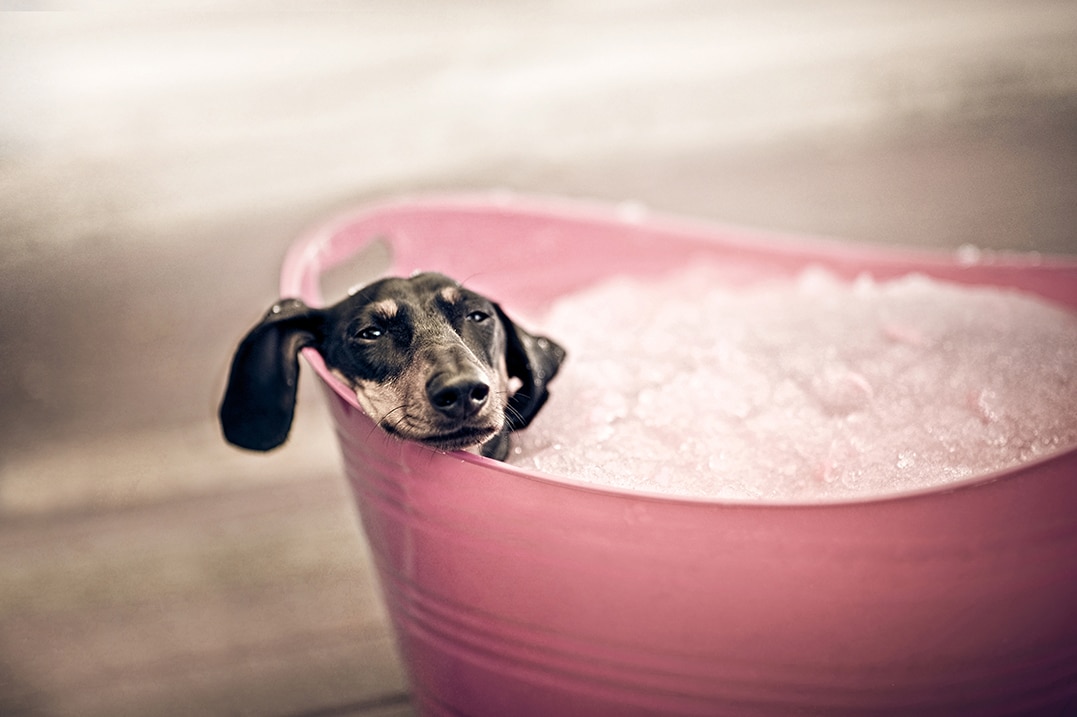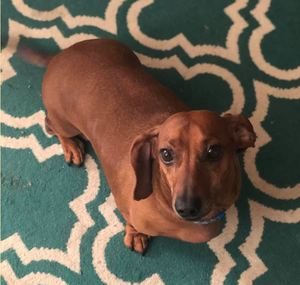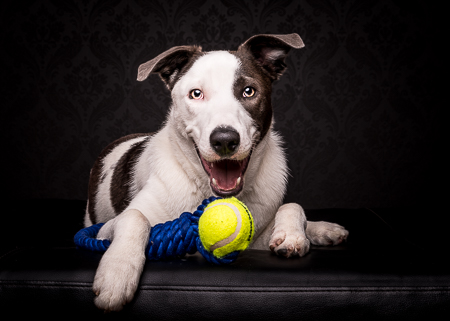
An interesting fact about Dachshunds in Australia is their numbers have grown over 500% in recent years! That’s according to the number of Dachshunds registered with the Australian National Kennel Club.
That makes them one of the fastest growing breeds – Dachshunds are taking over Australia!!
So why is this?
You probably agree the Dachshund’s adorable sausage-shaped body is what draws most people to this breed, but it’s also their larger-than-life personality which makes us fall in love with them.
I totally fell in love with Serena Hodson’s Dachshund Ralph, who feature’s in her beautiful coffee table book Dogservations:

If you love Dachschunds, and you love dog photography, then that book is a must. It’s hard to get hold of these days, but her more recent book Upside-Down Dogs is easily available on Amazon.
Main photo credit: Also the amazing Serena Hodson!
The profound loyalty, unmatched exuberance, and spunky attitude of Dachshund’s sets them apart from other dogs, and it’s fair to say they add excitement to any home.
While the Dachshund is an undoubtedly cute and vivacious pet, they are not for everyone. These small but mighty dogs are known for their very high prey and defence drives and are susceptible to a number of hereditary diseases.
In this guide to Dachshunds we’ll take a look at various aspects of the breed, which should help you decide if a Dachshund puppy is right for you, and also (importantly) what you should be feeding them!
A brief history of Dachshunds
It’s believed Dachshunds originated in early 17th century Germany. They were originally bred to aid hunters, particularly to chase badgers (and other small mammals) out of their dens.
Dachshund literally translates to “Badger Dog” in German (Badger in German is “Dachs”, and dog is “Hund”).
Dachshund’s are also known colloquially as a Doxie, Sausage Dog, or Weiner Dog.
True to their “Badger Dog” name they were exceptionally fit for the task since their short stature helped them squeeze into tight spots other hounds couldn’t, and their paddle-shaped paws helped them quickly dig.
Although the Dachshund ancestry is not entirely clear, it’s believed wire-haired Doxies were created by crossing the Saint Hubert Hound and the terrier. Later on, long-haired varieties were created by breeding the wire-haired Dachshund with spaniels – this created the long luxurious coat which would protect them while hunting in colder climates.
Today, Dachshunds are more likely to be found in their owner’s lap than hunting the fields, though they still enjoy digging and a great game of chase!
I also like to think modern day Dachshunds and badgers can be best of friends!
Is a Dachschund right for you?
Dachshunds can be a good match for anyone who loves the breed, with the only notable exceptions being families with young children or other pets.
Dachshunds are best suited to the following:
- Elderly people
- Couples
- Single people
- Small homes or apartments
- Moderately active people
- Homes without other pets
- Families with older children
To elaborate a little further, the main reason Dachshunds are not suited to homes with small children is because of their fragile backs. Their high prey drive can make them problematic if you have small pets such as hamsters or bunnies.
Health Concerns
Below are common health concerns associated with Dachschunds:
- Dachshunds are prone to both hereditary and lifestyle diseases.
- Their floppy ears make Doxies susceptible to ear infections, so care must be taken to keep these clean and dry (especially during bath time). Plucking the inner ear hair can also reduce the chances of inflammation and infection.
- Obesity is very common in this breed. As a Dachshund owner you will need to watch their weight carefully. Overweight Dachshunds are at a much greater risk of diabetes, back pain, joint problems, slipped discs, and heart disease.
- Their elongated torso makes Dachshunds prone to inter vertebral disc disease (IDD), a severe musculoskeletal disease caused by the spinal cord becoming pinched between the spinal vertebrae. IDD can cause paralysis or even death.
- Dachshunds are notorious for having poor dental health. This can be addressed with regular brushing or a diet consisting of raw meaty bones – the chewing helps fight tarter which causes tooth decay. Most vets would recommend a dry food dental formula or dental chews (like Greenies), but in my experience these aren’t optimum. As a Dachshund owner you may choose to have a professional teeth cleaning performed by your veterinarian once a year to remove the plaque buildup under the gums that brushing alone cannot reach.
- Joint issues such as hip dysplasia and patella luxation are also prevalent in this breed. Many vets recommend glucosamine and chondroitin supplements for both older and very active Dachshunds, although choosing the right diet should really help in this respect.
- Hereditary eye issues such as cataracts and progressive retinal atrophy (PRA) can affect older dachshunds.
The above may sound concerning, but I consider a good diet an excellent preventative to most of the above health conditions. It’s important to understand the ingredients of whatever food you decide to feed your Dachshund, be it dry, wet, raw, or fresh.
Make sure you read the reviews which will help you decide a healthy dog food.
What to feed a Dachshund?
Most Dachshund owners are drawn to Royal Canin Dachshund Puppy or Adult dry food which happens to be the only breed-specific food in Australia. Personally I question the ingredients, especially considering the prey-drive of a Dachshund which shows their more carnivorous nature.
Royal Canin Dachshund Puppy looks to contain a fair amount of rice and corn, and the Adult formula more rice, which probably doesn’t strike you as the best diet for your prey-mad Doxie.
Related: Royal Canin dog food review.
My recommendation would be to opt for a more meat-based dog food, with some good recommendations on the best rated list. For a Dachshund puppy it’s important to feed either a Puppy specific formula, or at the very least an “All Life Stage” formula which contains the minimum nutrients for all ages including the puppy phase.
Given a Dachshund’s susceptibility to ear issues and obesity, I would avoid any dry foods made with either wheat or cereals, or grain by-products in general, as I find these ingredients one of the key causes of ear issues, rashes, flakey skin, itchy paws, and weight gain.
To ward off potential joint issues and hip dysplasia, either opt for a food with whole-prey ingredients (many on the best rated list fit this bill), or consider glucosamine or chondroitin supplements. The occasional tin of sardines can boost joint health due to being rich in oils and omega fatty acids. Just make sure you buy the tins with whole sardines, as the cheaper tins can have the decent fish oil removed (often used for fish oil supplements etc).
I always recommend a variety, so even if you buy a more budget friendly base diet (budget friendly dog foods can be found here) and then add in some better options like BARF patties (Big Dog, Proudi) or one of the tip top options like Frontier Pets, Eureka, Lyka, and so forth.
Training treats for Dachshunds
For training treats I recommend ZIWI Peak or Eureka which are packed with nutrition. Using these “complete and balanced” dried foods as a training treat helps you add nutrition to a cheaper base diet!
Boiled (and frozen) diced chicken or other meat also makes for excellent and healthy training treats.
Just don’t get sucked in to buying one of the many cheap brands of treat which are mostly grains, food colourings, and dodgy preservatives. It’s easy to “over-treat” small breeds like Dachshunds, so you’re not doing your dog any favours with yucky treats they don’t need.
Life Span
12-16 years
Dachshund Price Range
The price range for Dachshunds varies substantially, and seems to have increased greatly in recent years. Some can be bought for as low as $300 while “Premium” Doxies can go for upwards of $4000.
Pricing depends on whether or not the dog has registration paperwork, but their lineage, colouring, gender, age, and breeder preference plays a large role in this as well. I always recommend researching a breeder to make sure they’re legitimate and have ethics.
Tips from Dachshund Show Breeders
I’ve put together a few tips from Dachshund Show Breeders to make the most of your dog, or to give you some great pointers if you’re bringing a Doxie puppy into the family:
- Never brush your long-haired Dachshund while their coat is wet – this is when the hair is most fragile and breakage prone.
- Pick a gentle shampoo that will not strip their natural oils. Something with soothing botanicals such as aloe or oatmeal is preferred for their sensitive skin. Aloveen Shampoo with oatmeal and aloe seems to be a favourite for many breeders, and is available from Pet Circle.
- Use duckbill-style hair clips to section your Dachshund’s hair while brushing and trimming; this will make brushing the undercoat easier and help you to give them a more precise cut.
- Bathing a Dachshund more than a couple times a month can create dry, flaky, skin and dull their coats. Use dog-safe wet wipes for minor cleaning and save bath time for when they are really dirty. You can also use an all-natural doggy deodorant between baths.
Pro Tip: No matter how frequently you brush your long-haired Dachshund they are bound to get a tangle now and then. Keep an eye out and tackle mats before they get worse, either with a deshedding tool like Paws For Life deshedders, or sometimes it’s best to cut them out.
What do owners have to say about their Dachshund?
I reached out to a number of Dachshund owners for feedback. I confess to being a Border Collie lover, and although my wife had a Dachshund before we met, I confess to never having the pleasure of owning one (yet!).

“The best thing about owning a Doxie, besides their sweet, charming demeanour, is their longevity (no pun intended).
I’m NOT an animal person by nature, so when I fell in love with this breed, I fell wholeheartedly knowing I have a pal for a very long time.
Be patient and consistent with potty training. Their devotion and infectious personalities make it worth the effort you need to put in when they’re a puppy!
Abbie Sharpe, owner of El Camino and Carmen

“Pros: He’s a sweetheart. He just wants to be by me. He doesn’t need a lot of exercise, and his coat is so velvety soft it couldn’t be more low maintenance if he was bald.
Cons: He’s kind of a diva. Coming from beagles in training, I’m not used to dogs who turn their nose up at certain treats. The breed is sort of known for having bad teeth if you don’t take care of them. He’s supposedly about 6 (years old), and just had eight teeth pulled when he went in for a dental. And of course, the risk of back issues is always a concern. He also barks at everything! Never aggressive, just loud.”
Katie Schirmer, owner of Squirt

“Potty train. Potty train. Potty train. Even if it means putting them in dog obedience classes – and buy indestructible toys (like Kong!)!”
Karli Hawthorne, owner of Bernie

“They love to be right next to you and truly are great companions. They have the best personalities, and are so funny but also very stubborn! Their worst traits would probably be their barking–a leaf will blow by, and they will bark at it!
Their barking is uncontrollable sometimes and it’s tough! But we wouldn’t trade them for the world!!”
Morgan Tolle owner of Luna and Apollo
The Dachshund Wrap Up
With any dog comes responsibility, but prospective Dachshund owners should know this breed will need extra care to help them live long and full lives. Potential owners should consider the level of care and training they require before committing to this breed.
As I say with any breed, be aware of what you’re feeding them – we all live on some kind of budget, so can only do our best.
The Dachshund breed is not recommended for homes with small children due to their fragility and predisposition to inter vertebral disc disease. Because of their proclivity for hereditary diseases, prospective owners should only purchase Doxies from reputable breeders.
Those who are up for the challenge of training and caring for these dogs will find that they make excellent family pets who love freely and protect those who care for them.
Do you have a Dachshund? Tell me all about him or her in the comments!!





